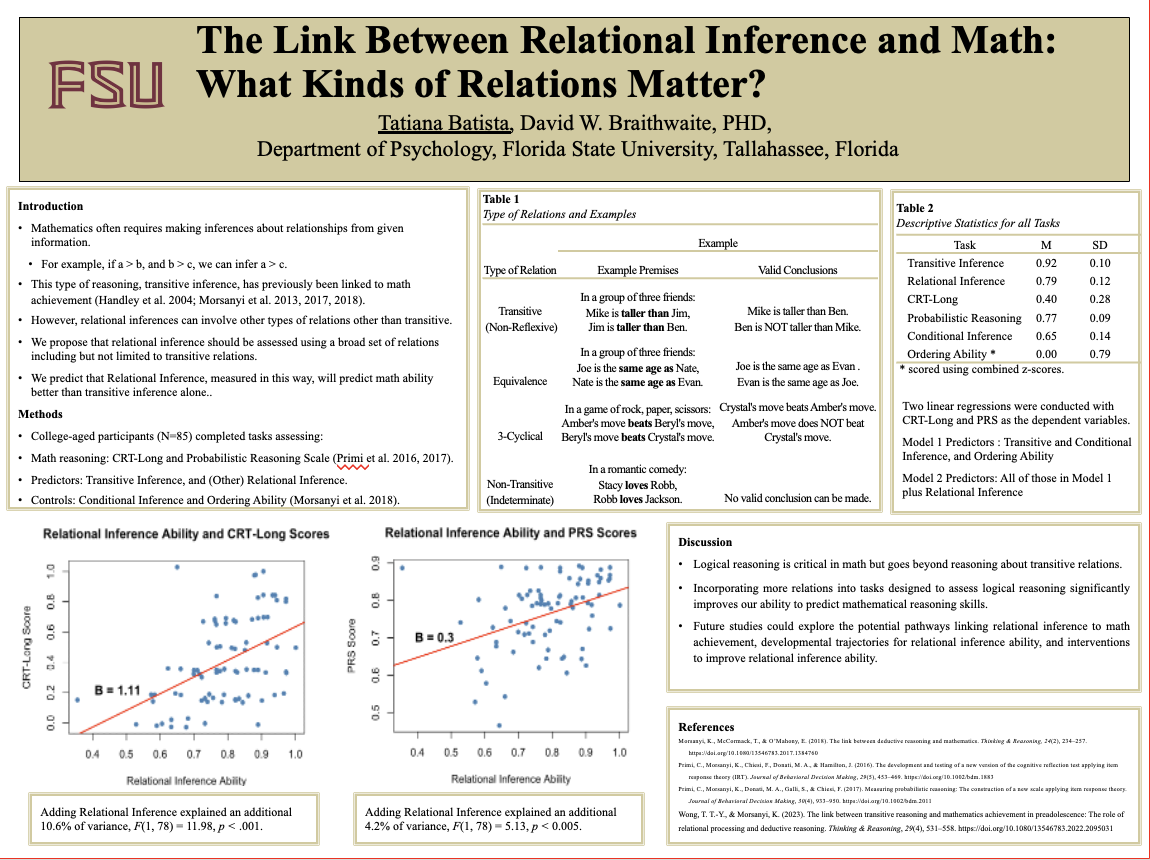Research Symposium
25th annual Undergraduate Research Symposium, April 1, 2025
Tatiana Batista Poster Session 1: 9:30 am - 10:30 am/ Poster #254

BIO
Hello! My name is Tatiana Batista. I am a fourth-year first-generation student pursuing a degree in Psychology and Human Development and Family Sciences. My hometown is Miami, Florida. I have worked in the Queen of Sciences Lab under Dr. David Braithwaite for the last three years. I initially conducted research into math self-efficacy before moving into cognitive psychology for my Honors Thesis on Relational Reasoning. After graduation, I plan on applying to graduate schools in the fall to continue my passion for research.
The Link Between Relational Inference and Math: What Kinds of Relations Matter?
Authors: Tatiana Batista, David W. BraithwaiteStudent Major: Psychology and Human Development & Family Sciences
Mentor: David W. Braithwaite
Mentor's Department: Psychology Mentor's College: Arts and Sciences Co-Presenters:
Abstract
Individual differences in the ability to reason about transitive relations (e.g., a > b, b > c, therefore a > c), termed “transitive inference,” are related to differences in mathematical skills among adults, children, and adolescents (Morsanyi et al., 2018; Handley et al. 2004; Morsanyi et al. 2013; Morsanyi et al. 2017), suggesting that transitive inference contributes to mathematical reasoning in general. However, logical inferences in math involve many types of relations other than transitive relations, such as non-transitive relations, which can indeed lead to valid conclusions despite previously thought otherwise. Furthermore, other forms of transitive relations, such as reflexive transitive relations, remain uninvestigated in traditional inference tasks. We propose that relational inference should be assessed using a broad set of relations not limited to transitive relations. We hypothesized that Relational Inference, when measured in this way, will predict math ability more than transitive inference alone. Participants (N=85), completed tasks assessing their math reasoning skills, conditional inference ability, ordering ability, and relational inference ability. Two hierarchical linear regressions were conducted in which model one contained: transitive inference, conditional inference, and ordering ability, while model two added relational inference (equivalence, indeterminate, 3-cyclical). Adding relational inference explained an additional 10.6% of the variance, F(1, 78) = 11.98, p < .001 in CRT-Long Scores, and an additional 4.2% of the variance, F(1, 78) = 5.13, p < 0.005 in PRS scores. The current study is the first to investigate both transitive and non-transitive relational structures in relation to math ability.
Keywords: Transitive Reasoning, Relational Reasoning, Logic

